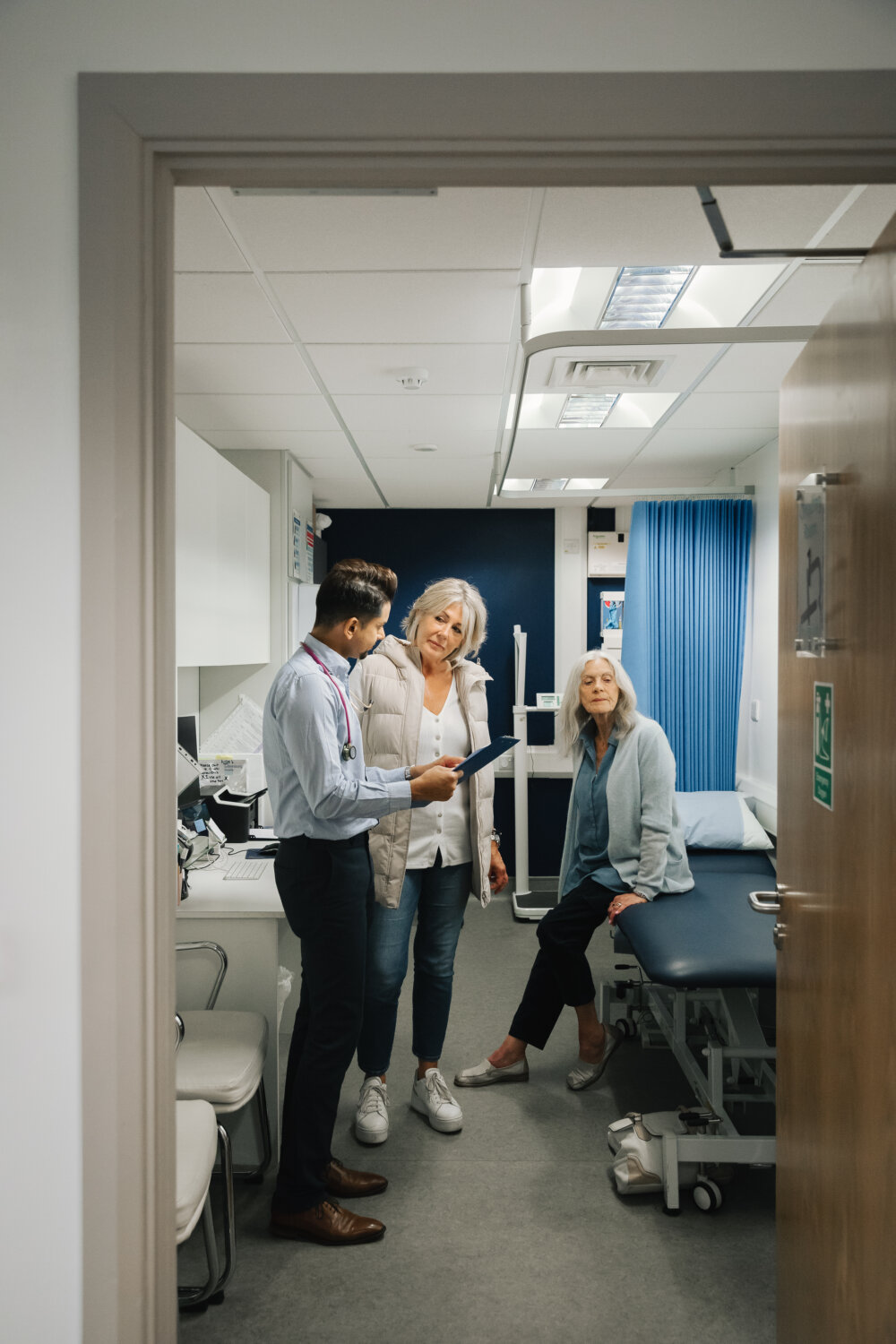What is a continuing healthcare checklist?

The NHS Continuing Healthcare Checklist is a vital assessment tool used throughout the UK to determine a person’s eligibility for ongoing healthcare funding. If you are considering putting yourself or a loved one forward for an assessment, you may have questions about what the Continuing Healthcare Checklist is, what criteria must be met in order to be eligible, how the assessment works, who carries this out, what is included in the checklist, and anything else you should expect from the process. At Home Instead, our aim is to help people age positively and in place by bringing expert care to their home. For nearly 20 years, we have been providing the highest standard of care, and creating industry-leading training programmes for our Care Professionals that are accredited by nursing and medical professionals. Today, we are the world’s largest global home care network, supporting over 100,000 older adults with personalised, tailored care at home. So whatever questions you have about the Continuing Healthcare Checklist, we can help.
What is a Continuing Healthcare Checklist?
NHS Continuing Healthcare is a package of ongoing NHS and social care that is both arranged and funded by the National Health Service here in the UK.The NHS Continuing Healthcare Checklist is a type of assessment used to find out if someone is eligible for ongoing healthcare funding. The assessment is aimed at individuals with complex health needs, and the checklist (the list of questions answered during the assessment) covers a range of areas, such as mobility, cognition, communication, nutrition, behaviour, psychological wellbeing, continence, medication management, and more. The assessment will be conducted through your local Integrated Care Board (ICB), and is usually made up of an initial checklist evaluation followed by a comprehensive assessment that looks more in-depth at your situation. If – after the checklist is carried out – your needs are thought to be mostly health-related, a full assessment will be carried out to ascertain your eligibility for NHS Continuing Healthcare funding. If deemed eligible, your necessary care costs would be covered. If you live with a disability or a long-term health condition you may be entitled to this funding, however it does not mean you are automatically eligible – everyone must go through the Continuing Healthcare assessment to determine whether their healthcare needs concern the treatment, control or prevention of a health condition, injury or disability. That said, the criteria for eligibility on the NHS Continuing Healthcare Checklist has been set intentionally low so that anyone who requires an assessment has the opportunity to apply for the care they need.

When should this checklist be completed?
The NHS Continuing Healthcare Checklist is typically started when a person’s health shows signs of deterioration, which usually begins conversations about ongoing care for the future. The checklist is used during any healthcare transitions, for example if someone has recently been discharged from hospital or their care needs suddenly change. There is no set rule for when a Continuing Healthcare Checklist should be implemented, but the checklist is often used by healthcare professionals such as hospital discharge teams or social workers to identify whether or not someone is eligible for NHS Continuing Healthcare funding. Before any assessment can be carried out, the checklist is an important step, and choosing the best time to do this is crucial to ensure there are no delays in care, particularly if you have complex health needs and require access to the necessary resources.Some examples of when a checklist might be used include if a person shows signs of significant and complex care needs, or if their mental or physical health shows significant signs of deterioration. Ultimately, a checklist can be requested at any time.
What criteria must be met?
The eligibility criteria that must be met for NHS Continuing Healthcare funding depends on each person’s own health needs, but typically centres around substantial and ongoing care needs that result from a complex, intense or unpredictable health issue, or multiple health issues. NHS Continuing Healthcare funding is only available to adults, as children and young people with complex care needs must apply for funding through a separate scheme. Criteria for NHS Continuing Healthcare eligibility depends on whether or not you have a ‘primary health need’, which is essentially a need that relies on addressing or preventing an element of your health. Your eligibility is assessed by a team of professionals who will consider:
- What you need help with
- The complexity of your needs and how intense these needs can become
- The unpredictability of your needs
- Any health risks if you do not receive the care you need
Remember, your eligibility for NHS Continuing Healthcare funding depends on what is determined from your assessment – you are not automatically entitled to funding based on a diagnosed condition, so you will need to carry out the checklist and assessment regardless of your situation.

What is the outcome of the checklist?
The outcome of the checklist is either:
- A positive checklist, which means you will be eligible for a full assessment. In this case you will be referred to your Integrated Care Board (ICB), which is the NHS organisation that commissions local health services. After a maximum of 28 calendar days from the date they receive your positive checklist, you will be sent an eligibility decision.
- A negative checklist, which means you do not require a full assessment and will not be eligible for NHS Continuing Healthcare funding. In this case you will be sent a written explanation as to why this is the case, and you will have the right to ask them to reconsider this decision if you feel you do need an assessment.
According to the NHS website, if you need urgent care such as palliative care, then your assessment could be fast-tracked.
Who carries out the checklist and assessment?
Anyone can request a Continuing Healthcare Checklist to be completed, but this must be completed by a relevant health or social care worker, such as your GP, care provider, district nurse, social worker, or another healthcare professional involved in your care. Whoever is completing the checklist on your behalf should give you plenty of notice that they are doing so, so you can be involved in the process if you wish to be. If your initial checklist assessment comes back positive and you could potentially be eligible, your Integrated Care Board will then organise your full assessment for NHS Continuing Healthcare funding, where a team of professionals from various disciplines will conduct a more in-depth assessment of your needs in order to determine your eligibility for ongoing healthcare funding.
How does the initial checklist work?
The initial checklist for NHS Continuing Healthcare acts as a preliminary evaluation. The checklist is extensive as it looks at all areas of a person’s health and social care needs, and you can view a blank copy of the NHS Continuing Healthcare Checklist on the GOV.UK website to get an idea of the sort of evaluation you might receive. Once this checklist has been requested, it should be completed by one of the aforementioned care or healthcare professionals within 14 days.
What is included in the checklist?
The NHS Continuing Healthcare Checklist includes a number of questions and criteria that are used to assess a person’s care needs, and it covers various aspects of health and wellbeing to determine their eligibility for funding. It is important to note that the specific details of your checklist may vary depending on your individual situation, but typically it assesses factors like mobility, cognition, communication, behaviour, wellbeing, nutrition, continence, medication management and more – everything they need to make an informed decision on what sort of care is needed to keep you healthy, safe and comfortable. According to the NHS website, the checklist may consider aspects of your health and care, such as:
- Breathing
- Nutrition (food and drink)
- Continence
- Skin (including wounds and ulcers)
- Mobility
- Communication
- Psychological and emotional needs
- Cognition (understanding)
- Behaviour
- Drug therapies and medicine
- Altered states of consciousness
- Other significant care needs
Each of these needs will be assigned either ‘priority’, ‘severe’, ‘high’, ‘moderate’, ‘low’ or ‘no needs’, and if you have at least one priority need, two severe needs, or a number of severe and high or moderate needs, you may be eligible for NHS Continuing Healthcare.
What type of care can Continuing Healthcare funding provide?
NHS Continuing Healthcare is not means tested, and the funding received can be used to pay for care either in your own home, or in a care home or nursing home. Due to the personalised nature of the assessment, this funding can often be used for a number of different types of care, including specialised medical care, personal care, therapies, and more. It can cover the costs of things like healthcare professionals, specialised equipment, and home adaptations to facilitate independent living. The funding is designed to meet the unique and evolving needs of each individual recipient, with a focus on quality of life and person-centred care. If you choose to receive care in your own home, you may be able to use this funding for things like:
- Home care to help with daily personal care needs such as getting washed and dressed, and cooking meals
- Overnight care to help with your needs and safety throughout the night, and make sure there are no breaks in care
- Live-in care to ensure a trained professional carer is always around to help with anything from personal care to mobility assistance and more
- Respite care to offer any regular carers and/or family members a break from care duties in order to continue providing the best care possible

Is there anyone I can turn to for additional support?
The process of going through the NHS Continuing Healthcare Checklist can feel confusing and overwhelming, so this guide is designed to demystify this and offer the information you need to get started.
If you are seeking additional support for this process, you can reach out to your GP (or your loved one’s GP, if you are seeking this on their behalf), or to a healthcare professional in charge of care such as a district nurse. A social worker or your local NHS team may also be able to point you in the right direction for what you need.
The NHS website has information about the process of the Continuing Healthcare Checklist and subsequent assessment, and they have a number of helpful FAQs that may be relevant to your situation and could help answer specific questions.
Also, Beacon is an organisation offering free independent advice on the NHS Continuing Healthcare process, so you can take a look at their website or call their free helpline for more information: 0345 548 0300
Starting the NHS Continuing Healthcare Checklist process may seem daunting, but there are a number of resources to help once you get started, and instructions for each new stage. If you believe you (or a loved one) have care needs that should be addressed soon, beginning this process is the first step to putting the relevant care in place to help you feel safe.

Home Instead is an award-winning home care provider and part of a worldwide organisation devoted to providing the highest-quality relationship-led care for older people in their own homes. Arranging care for yourself or your loved one shouldn’t be stressful, so whatever questions you would like answered, feel free to reach out to the Home Instead team to discuss your needs.

Diane WIlliams , Head of Quality & Standards
Before joining Home Instead, I built a comprehensive career in the social care sector, beginning in 1991 as a frontline care worker and advancing to senior leadership roles across both private and voluntary sector businesses.
Throughout my career, I have supported diverse care groups in a variety of settings, including community, residential, nursing, and secure environments. My experience spans working with older adults, including those living with dementia; individuals with physical disabilities and complex, long-term health needs; people with learning disabilities, including autism; individuals with enduring mental health challenges; individuals with current or past substance use and those with forensic backgrounds.
In 2002, I qualified as a social worker and have since maintained my professional registration with Social Work England.